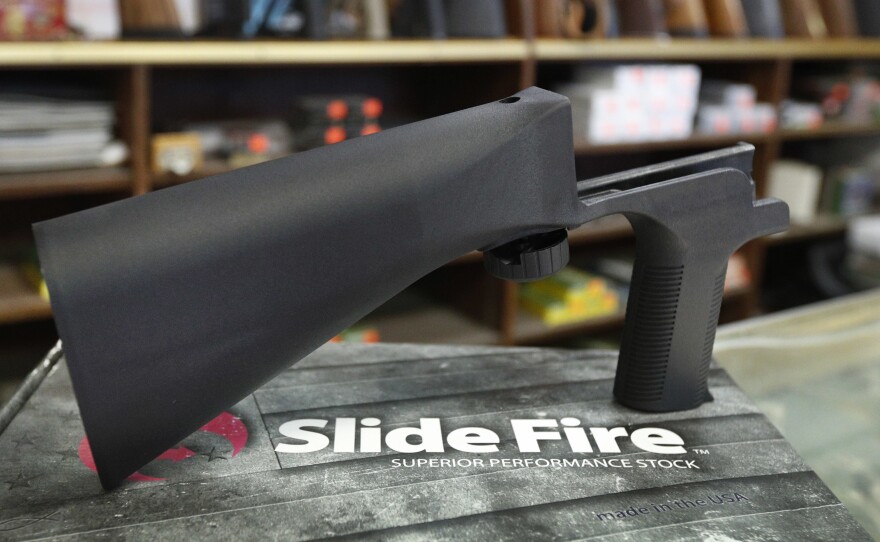Slide Fire Solutions, the company that invented and manufactures bump stocks, announced Tuesday it is shutting down production.
A notice on its website reads, "On Sunday, May 20, 2018 at midnight CST, Slide Fire will cease taking orders for its products and shut down its website."
Bump stocks are modification devices used to accelerate a gun's shooting rate so it fires like an automatic weapon — almost as fast as machine guns, which are largely outlawed.
Slide Fire President Jeremiah Cottle designed and holds the only approved patent for bump stocks.
It's unclear whether the freeze will be temporary or permanent, or what might happen to the factory in Texas. Slide Fire did not respond to NPR's requests for comment. And the posted notice asks visitors to the site to enter an email address to "stay updated on any future news."
The devices, and Slide Fire products specifically, have come under intense public and political scrutiny since the rapid-fire gun accessory was used in the Oct. 1, 2017, Las Vegas mass shooting that left 58 dead and hundreds more injured.
Three of those victims have filed a lawsuit seeking class-action status against Slide Fire and any future bump stock manufacturers for negligence. According to the complaint, "this horrific assault would not and could not have occurred, with a conventional handgun, rifle, or shotgun, of the sort used by law-abiding responsible gun owners for hunting or self defense."
Court documents also allege that Slide Fire manufactured, marketed and sold devices to gun owners who wanted semi-automatic rifles to mimic fully automatic weapons, "thereby subverting federal law that has highly regulated machine guns for over 80 years."
"Slide Fire's decision is just something they're doing now to try to relieve political pressure they're under," Robert Eglet told NPR.
Eglet is a senior partner at Eglet Prince, the firm that filed the class-action lawsuit on behalf of the Las Vegas victims along with the Brady Center to Prevent Gun Violence. He contends the shutdown is a strategic move by the company to "put the brakes on any congressional movement that would prevent them or anyone else from producing these bump stocks in the future."
This is not the first time Slide Fire is halting production. As NPR reported, it suspended sales shortly after the devices were used in the Las Vegas shooting in October. But less than a month later, days after another mass shooting in Texas, Slide Fire restarted production on the controversial accessories.
Regardless of what the company does or doesn't do, Eglet said, he and his clients are continuing to pursue this case.
"We want to sue these people out of business and send a message to any future manufacturers that that's what will happen to them if they try to make and sell these devices to the public," Eglet said.
The devices have been legal since June 2010, after the Bureau of Alcohol, Tobacco, Firearms and Explosives determined a bump stock "is a firearm part and is not regulated as a firearm under [the] Gun Control Act or the National Firearms Act," according to a letter from the ATF to Slide Fire.
Bloomberg reported that Slide Fire, which is the nation's only manufacturer of bump stocks, earned more than $10 million in sales in its first year of business.
The company was engaged in a years-long patent infringement battle with another manufacturer, FosTecH Outdoors, but that was settled in 2012. The rival company has since gone out of business, the founder told Reuters.
The carnage of the Las Vegas shooting, exacerbated by Stephen Paddock's use of bump stocks, has altered the national debate on gun control regulations. It prompted President Trump to call for a ban on the devices, and in March, the Justice Department took the first step in banning their sale, manufacture or possession.
Copyright 2018 NPR. To see more, visit http://www.npr.org/.






